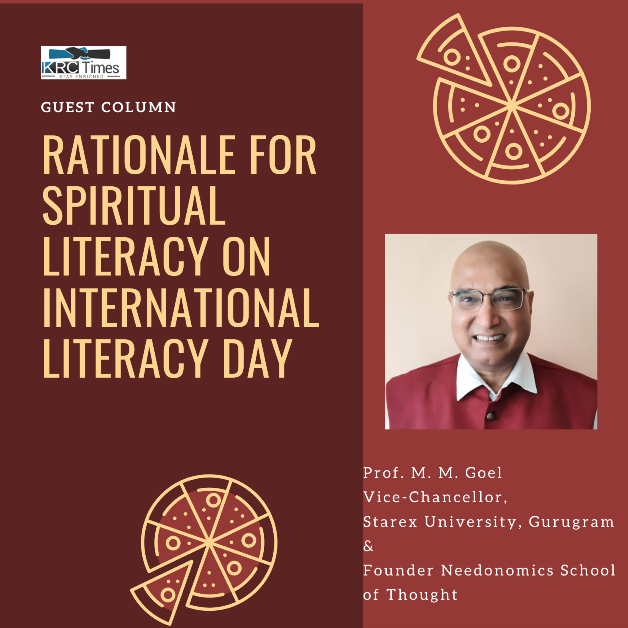We must learn to manage the discords and disputes with solutions that exist for everything
 Dr. M. M. Goel
Dr. M. M. Goel

To commemorate International Literacy Day on September 08 more than an annual ritual by UNESCO (United Nations Educational, Scientific and Cultural Organization), we need spiritual literacy for the endemic of the pandemic covid. As a humble teacher from a family of teachers, I believe that spiritual bankruptcy and commercialization of education are the root causes of deteriorating standards in education at all levels. The relationship between the teacher and the students is polluted to a considerable extent due to the facts and deserves the attention of the stakeholders with enthusiasm for spiritual literacy.
Since 1967, International Literacy Day (ILD) celebrations have taken place annually around the world to remind the public of the importance of literacy as a matter of dignity and human rights, and to advance the literacy agenda towards a more literate and sustainable society.
Spiritual Literacy is literature impacting spirituality designed to foster and support spirituality via reading and writing for an individual human being. It allows one to increase the knowledge and its base of spiritual learning. One can be spiritual without being religious. Spirituality involves the recognition of a feeling or sense or belief that there is something greater than self, something more to be human than sensory experience as divine in nature. An opening of the heart is an essential aspect of true spirituality.
Spirituality is the state of having a connection to God and the creation. An example of spirituality is praying every day for public well-being. Concern for unseen and intangible as opposed to physical or mundane as the quality of being spiritual.

To my mind, international literacy day challenges us to read at least one book on spirituality. We can broaden our minds or deepen our faith by reading a book about spirituality most notably Gita and Anu-Gita. It is pertinent to mention that Anu-Gita is a little-known part of the Mahabharata and occurs towards the end of the great epic. After the Mahabharata war, when peace was established, Lord Krishan told Arjun that he would like to go to Dwarka. Arjun said, before you go, please teach me the Gita once more, because I have forgotten a large part of what you taught me on the battlefield of Kurukshetra. Krishan’s reply to Arjun at that time is called Anu-Gita– the prefix ‘anu’ meaning ‘after’. In Mahabharta, Gita occurs in Parva no 6, while Anu-Gita occurs in Parva no 14 of the total 18 Parvas. Anu-Gita has 36 chapters (compared to 18 chapters in Gita) and 1040 slokas ( compared to 700 slokas in Gita).
Being a spiritual person is synonymous with being a person whose highest priority is loving self as a soul and others too as souls. A spiritual person cares about people, animals, and the planet. A spiritual person knows that we are all one, and consciously attempts to honour this oneness. A spiritual person is a kind person.
It is pertinent to know that all cultures across the world have some form of symbolism related to the four elements of spirituality – fire, water, air, and earth. It is widely acknowledged that these four elements sustain living beings and make life on earth possible. The Greek philosopher Aristotle was the first to theorize about the four elements in 450 BC.
It needs to be noted that no life circumstances are 100 percent negative and have something good within it with opportunities. All of us must reach perfection by transforming all the negative qualities into positive qualities.
Self-realization and self-surrender create golden moments in life which fall in the domain of spiritual literacy. The true self is pure existence which can be seen with persistent efforts. The true self as a soul is the state of fearlessness without FEAR ( false evidence of appearing real) of death. True love is unconditional giving without any expectation in return. Love is god. True-self is a small creation of god as a force full of energy.
We have to understand the concept of self-surrender to whom one loves and is fearless. It is a way of life with more responsibility for the self. We can create golden moments with responsibilities towards the self and the universe with self-surrender.
The ultimate objective of an individual should be to do good deeds during the lifetime so that no worries after death for moksha and to be understood as Jiwan Mukti as authenticated in Anu-Gita.
We must learn to manage the discords and disputes with solutions that exist for everything. We should avoid anything which spread hatred among people. It is to be understood that ego is the root cause of all disputes quarrels and wars among people and nations.
We have to adopt forgiveness and forget the past (yesterday) and start afresh every day.
It needs to be understood that there is a cure for all the ills in society and there are Vedic pills with correct understanding from the Gita which leads to happiness. To create a work culture in educational institutions in India, there is a need of converting holiday culture into holy-day culture. It is firmly believed by the author that the rate of progress in spiritualism is faster than the rate of progress in materialism, therefore, there is a need of accepting spiritually guided materialism making a case for ‘needonomics’ as a solution of various problems in present times of covid created crisis. There is no doubt that India will emerge as a leader of the world on its spiritual strength only and not on the basis of anything else. To make it happen we should adopt an evolutionary approach and should not expect miracles. We need to accept Gita as an ism neutral and sacro-secular epic on welfare economics and management with sermons for the entire humanity including the teachers and their trainers for the survival, existence, and excellence in present times of covid crisis.
We have to create peace with the self to be really spiritual. All of us deserve to be spiritually literate as souls with sermons from Gita and Anu-Gita more than look at TV, listen to TV, and learn from TV as 3L of literacy in present times of the covid era.
(Prof. M.M. Goel is the Vice-Chancellor, Starex University, Gurugram and Founder Needonomics School of Thought) www.starexuniversity.com, www.needonomics.com
Advertisements | 5E For Success

Ideal for students and job seekers.
Mail resume to- 5eforsuccess@gmail.com




